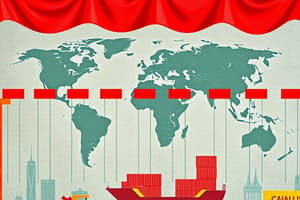Podcast
Questions and Answers
What is globalisation?
What is globalisation?
The increasing interconnectedness of people and places in an ever-shrinking world.
Globalisation is currently in decline in some areas.
Globalisation is currently in decline in some areas.
True (A)
What percentage of the UK population voted to leave the EU in the referendum on June 23, 2016?
What percentage of the UK population voted to leave the EU in the referendum on June 23, 2016?
- 72%
- 48.11%
- 51.89% (correct)
- 13.1%
What was the voter turnout for the UK EU referendum?
What was the voter turnout for the UK EU referendum?
What date did the UK officially leave the EU?
What date did the UK officially leave the EU?
The EU operates as a single market allowing free trade, including no tariffs.
The EU operates as a single market allowing free trade, including no tariffs.
What percentage of UK exports went to the EU between 2006 and 2018?
What percentage of UK exports went to the EU between 2006 and 2018?
Who was the Prime Minister during the time of Brexit discussions?
Who was the Prime Minister during the time of Brexit discussions?
Flashcards
Globalization
Globalization
The increasing interconnectedness of people and places in a shrinking world.
De-globalization
De-globalization
A decline in global interconnectedness; a trend toward more nationalistic and self-sufficient eras.
Brexit
Brexit
The UK's withdrawal from the European Union.
European Union (EU)
European Union (EU)
Signup and view all the flashcards
Single Market
Single Market
Signup and view all the flashcards
Trade Agreements
Trade Agreements
Signup and view all the flashcards
Referendum
Referendum
Signup and view all the flashcards
Voter Turnout
Voter Turnout
Signup and view all the flashcards
Nationalistic
Nationalistic
Signup and view all the flashcards
Self-sufficiency
Self-sufficiency
Signup and view all the flashcards
Study Notes
Introduction to Globalization
- Globalization is the increasing interconnectedness of people and places.
- Factors driving globalisation include developments in technology, finance, security, and trade agreements.
- Trends suggest some areas of globalisation are declining, leading to de-globalisation.
- A critical analysis of globalisation's advantages and disadvantages (environmentally, socioeconomic, culturally) is required.
- Recent events and developments show a rise in nationalism and self-sufficiency.
Brexit
- UK held a referendum in June 2016 on EU membership.
- 51.9% voted to leave, and 48.1% to remain.
- Significant voter turnout (72%).
- Leaving the EU was a prolonged process.
- Boris Johnson's 2019 general election victory cleared the path.
- UK formally left on January 31, 2020.
- Further negotiations will follow.
- Potential benefits and drawbacks of Brexit are of interest.
Advantages of EU Membership
- UK contributed to EU budget (£13.1 billion annually).
- Received EU funding (regional fund) offsetting some of their contributions.
- Net contribution around £8.5 billion.
- EU single market provided tariff-free trade and facilitated trade with other countries.
- UK exports to EU made up a large portion (45-55%) of the total exports
Disadvantages of EU Membership
- Some felt that the EU was reducing power of sovereign states.
- EU regulations led to reduced domestic control in the UK.
- Free movement of labor caused migration issues (e.g., housing shortages in specific areas).
- Some argued that EU membership may have increased the risk of terrorist attacks.
- Possible uneven distribution of benefits across the UK.
President Trump and "America First"
- Trump's presidency aimed at reducing US engagement in global governance.
- Policies like trade conflicts (tariffs with China) reflected this initiative.
- Trade disputes with China resulted in tariffs on billions of dollars worth of goods.
- Trump's administration also withdrew from the Paris Climate Agreement.
- Decoupling from global agreements (e.g., from WHO) was also a factor.
Rise Against Cultural Globalisation
- Starbucks, a global coffee shop chain, has 20,000 shops in 60 countries.
- Cultural globalisation has spread global culture.
- Also cultural homogenisation; people see it as a positive.
- Rise of independent shops and local businesses; a form of resistance.
- Concepts of 'glocalisation' (adapting for local culture) have emerged.
Negative Effects of Globalisation
- Job losses in developed nations due to outsourcing to developing countries.
- Increased pollution due to more international transportation and technological use.
- Influence of large corporations on national policies and practices in nations in which they operate.
- Example: Apple's factory conditions in China (overtime, underpayment, and exposure to dangerous chemicals).
Conclusion
- Despite existing de-globalisation tendencies, globalisation is likely to continue.
- Brexit's impact on global trade remains uncertain.
- Importance of considering the complexities of globalisation.
- Ongoing debate about the degrees of de-globalisation taking place.
Studying That Suits You
Use AI to generate personalized quizzes and flashcards to suit your learning preferences.




